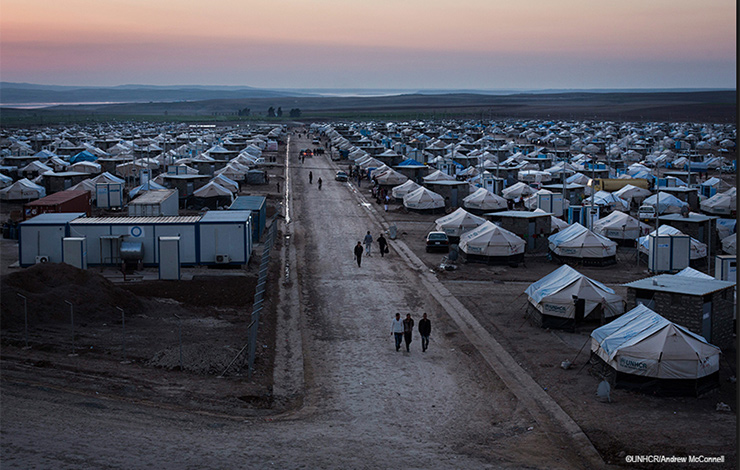


As the world marked International Migrants Day on December 18 with a worldwide candlelight vigil to commemorate migrants and refugees who perished this year, the United Nations High Commissioner for Refugees (UNHCR) released shocking new figures of forced displacement worldwide. By the end of 2015, it’s likely that the figure of displaced people will surpass 60 million—as many as the populations of Canada and Australia combined, or the entire population of Italy. The sharp increase of Syrian refugees trying to reach Europe via the Mediterranean, the steady flow of refugees from protracted conflicts in Afghanistan, Somalia, and South Sudan, as well as lesser known flows such as those of Central Americans fleeing intense criminal violence, have contributed to the largest refugee crisis since World War II.
As 2015 shapes up to be "The Year of the Refugee," last week High Commissioner António Guterres used his annual dialogue on protection to urge attention to the root causes of the global displacement crisis, central among them gaps in rule of law and governance structures. Rule of law was also the focus of the High Commissioner's 2015 Note on International Protection.
Contemplating root causes such as the rule of law may seem an unaffordable luxury in a time of crisis. Migrants stranded in boats in the Mediterranean and children risking dangerous unaccompanied journeys to the US require immediate attention. Why is the UN refugee agency putting long-term projects like building the rule of law front and center in the debate?
There are at least three reasons the international community should grapple with the rule of law dimensions of the current refugee crisis, even as it deals with immediate humanitarian needs. First, data show that there is a direct correlation between countries’ coping capacity—understood as the strength of their institutions and infrastructure—and the existence and scale of forced displacement. Afghanistan, with the second to lowest score in the World Justice Project’s Rule of Law Index, was the world's leading producer of refugees for more than thirty years—even through the conflicts in the Balkans, Central Africa, and Iraq—and was surpassed only in 2014, by Syria.
The focus of any effective and long-lasting response to forced migration should be preventing it from happening in the first place: by assuring that checks on government power are in place; that civil society can organize and voice its views without facing repression; that minorities are not discriminated against or excluded from political participation; that corruption does not destroy institutions; that the streets are safe; and that investment finds conditions that lead to economic growth which keeps youth employed and gives families a future. Only then can we eliminate the extreme conditions that drive people to uproot themselves en masse.
Second, a rule of law-focused approach, with its emphasis on strengthening governance across many sectors, can help foster a more integrated, holistic, and sustainable response to the refugee crisis. A fundamental shortcoming of many international responses to crises today is that they are fragmented, with different communities of practitioners working in stovepipes. Long-lasting solutions to forced migration require a joined-up response, integrating rule of law development into a broad range of development and humanitarian assistance programs addressing such topics as the environment, health, and food security, and leveraging this assistance to advance systemic institutional reforms. As the High Commissioner highlighted in his remarks during the protection dialogue in Geneva, “It is clear that we cannot treat these causes in silos, but have to consider them together […] development cooperation also has a key role to play in efforts to address the root causes of displacement.”
Rule of law interventions can bring together development and humanitarian actors under similar funding streams and shared objectives, working in coordination with local authorities and civil society to find sustainable solutions. For example, the American Bar Association Rule of Law Initiative's work to address sexual and gender-based violence in the Democratic Republic of Congo involves collaboration with humanitarian actors, national civil society organizations, lawyers, and the government to respond to immediate needs for care and protection of victims while also strengthening justice sector institutions and fostering the long-term development of a culture of legal accountability for these crimes.
Finally, the rule of law encompasses an international dimension, including the treaties, general principles, and customary law that, if observed, provide a roadmap for appropriate state responses, ensure access to people in need for humanitarian agencies, and provide minimum guarantees and safeguards to uphold human dignity.
For all of these reasons, we applaud the reinvigorated focus on prevention and on the rule of law-related root causes in the international discussion about migration. The challenges ahead are enormous, and humanitarian response must be bolstered to meet the emergency needs of millions. But we must once and for all find a way to get ahead of the crisis by building protective environments that make emergencies an exception rather than the rule.